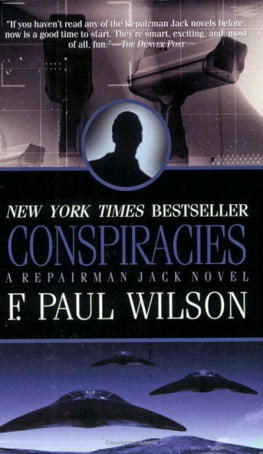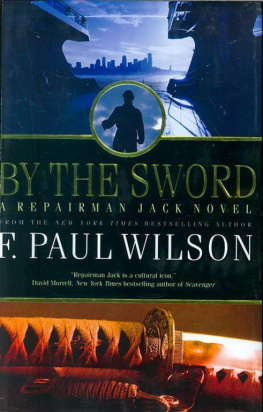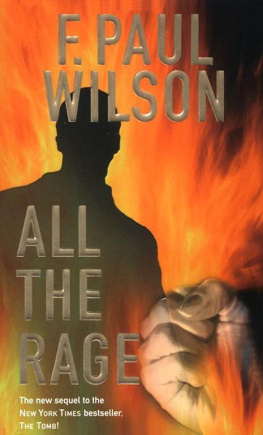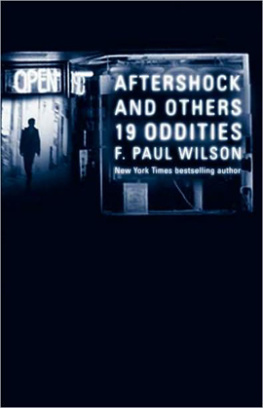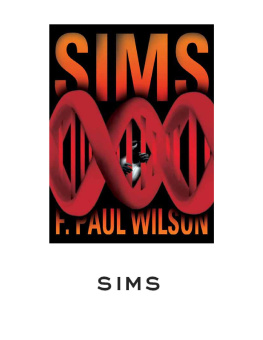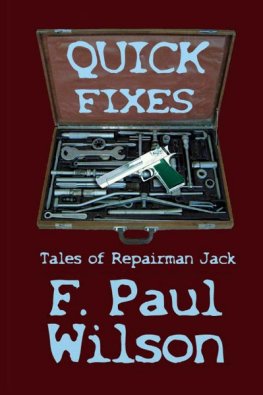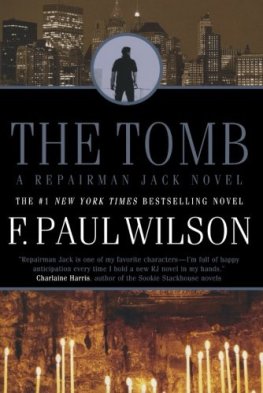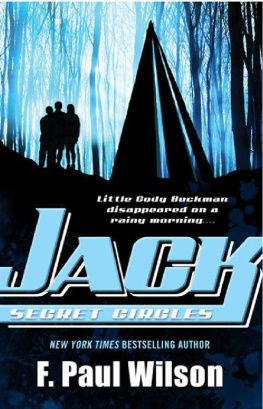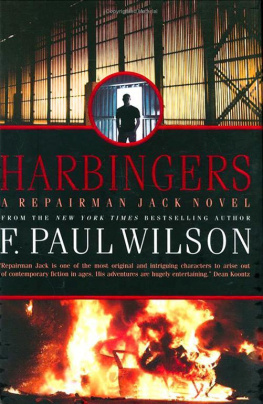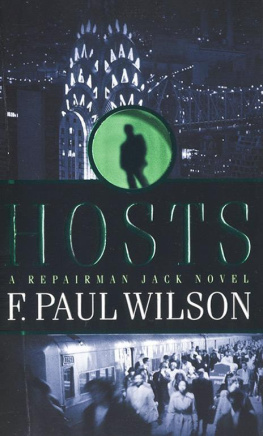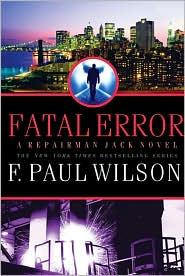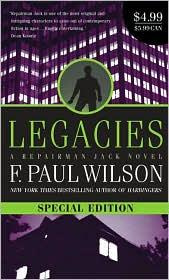Conspiracies
A Repairman Jack Novel
F. Paul Wilson
for
Ethan Paul Bateman(E-Man!)
Special thanks to
Tom Valesky(again) and
Gerald Molnar fortheir marksmens eyes for weapons errors.
TUESDAY
Jack looked around the front roomof his apartment and figured he was either going to have to move to a biggerplace, or stop buying stuff. He had nowhere to put his new Daddy Warbucks lamp.
Well, not new exactly. It had beenmade sometime in the 1940s, but it was in great shape. The base was a glazedplaster cast of Daddy from the waist up, his hand gripping a lapel of histuxedo, a tiny rhinestone in place of his diamond stick pin. He was grinning,and his pupilless eyes showed not the slightest trace of concern about the lampstem and socket shell emerging from his bald pate.
Jack had found it in a Sohonostalgia shop, and talked the owner down to eighty-five dollars for it. Hewould have paid twice that. The apartment didnt need another lamp, but Jackneeded this one. Warbucks was such a stand-up guy. No way Jack could pass itup. No bulb or lampshade, but that was easily remedied. Problem was, where toput it?
He did a slow turn. His home wasthe third floor of a brownstone in the West Eighties, and smelled of old wood.Not surprising since the place was crammed with Victorian golden oak furniture.The walls and shelves were cluttered with memorabilia and tchotchkes from thethirties and forties. Everything in sight except for the computer monitorexisted before he was born. Even the Cartoon Networkhe could see thelarge-screen TV in the extra bedroomwas playing a toon from the thirties witha big-eyed owlet crooning how he loved to sing-a, about the moon-a anna June-aanna spring-a ... And here in the front room, not a single empty horizontalsurface left ...
Except for the computer monitor.
Jack placed the Daddy Warbucks lampon top of the monitor, which sat atop Jacks antique oak rolltop desk. Theprocessor sat on the floor in the kneehole, and the keyboard hid under therolltop. The monitor didnt look comfortable perched up there, but then, thecomputer didnt really fit anywhere in the rooma plastic iceberg adrift in asea of wavy-grained oak.
But you couldnt be in businessthese days without one. Jack didnt understand all that much about computers,but he loved the anonymity they afforded in communications.
He hadnt checked his email sincethis morning, so he lit up the monitor and rolled up the tambour top to revealhis keyboard. He logged on through one of his ISPsJack had multiple accountsunder various names with a number of Internet service providers, and maintaineda Web site through one of them. Everything hed read said that people wereincreasingly looking to the Internet to solve all sorts of problems, so Jackfigured he might as well make himself available to folks searching there forhis kind of solution.
Half a dozen emails from the Website waited, but only one seemed worth answering, and that barely:
Jack
I need your help. Its about mywife. Please call me or email me back, butpleaseget back to me.
It was signed Lewis Ehler andhed left two numbers, one in Brooklyn, the other on Long Island.
Its about my wife ... notsome guy who wanted to know if she was cheating, he hoped. Marital problemswerent in Jacks line.
He had another job just startingup, but that promised to be mostly night work. Which meant his days would befree.
He wrote down the numbers, thenheaded out to make the call.
Jack walked east toward CentralPark, looking for a phone he hadnt used recently, while the little toon owlssong echoed in his head.
I love to sing-a, about themoon-a anna June-a anna spring-a
Spring had sprung and NYC waslurching out of hibernation. The air smelled fresh and clean, bright flowerspeeked from window boxes on the upper floors of the brownstone regiments, andtiny leaf buds bedizened the branches of the widely spaced trees set in thesidewalks. The late morning sun sat high and bright, keeping Jack comfortablein a work shirt and jeans. Winter coats were gone, leaving short skirts andlong legs on display again. A good day to be alive and heterosexual.
Not that the women paid muchattention to him. They barely seemed to notice the guy with the so-so build,average-length brown hair, and mild brown eyes. Which was just fine with Jack.Hed be disappointed if they did, considering the effort he put into being awalking trompe loeil.
Jack cultivated anti-presence. Theanonymous look took effortnot too trendy, not too retro. He kept an eye onwhat the average guy on the street was wearing. Jeans and flannel shirts neverwent out of style, even here on the Upper West Side; neither did sneakers andwork bootsreal work boots. Twill work pants were another safe betneverstylish, but they never attracted attention either.
He found a pay phone on CentralPark West. The apartment buildings stopped dead here, as if sliced off with aknife for dozens of blocks in either direction to leave room for the parkacross the street. Through the still-naked trees he could see the Lake, a bluelozenge in the greening grass. No boats on it yet, but it wouldnt be long.
He tapped in the access number onhis prepaid calling card. He loved these things. As anonymous as cash and ahell of a lot lighter than the pocketful of change he used to have to carry.
Everybody seemed so frightened ofthe potential threat new electronics posed to security. And maybe it was agenuine peril for citizens. But from Jacks perspective, electronics offered ananonymity bonanza. He used to keep an answering machine in an empty office onTenth Avenue, but a few months ago he unplugged it and had all calls to thatnumber forwarded to a voice-mail service.
Email, voice mail, calling cards... he could almost hear Louis Armstrong singing, What a wonderful world.
Jack punched in the Brooklyn numberEhler had left. He found himself talking to the Keystone Paper Cylinder Companyand asked to speak to Lewis Ehler.
Whom shall I say is calling? saidthe receptionist.
Just tell him its Jack, callingabout his email.
Ehler came on right away. He spokein a wheezy, high-pitched voice accelerating steadily in an urgent whisper.
Thank you so much for calling.Ive been half out of my mind not knowing what to do. I mean, since Mels beengone Ive
Whoa, whoa, Jack said. Gone?Your wifes missing?
Yes! Three days now and
Wait. Stop right there. We cansave me time and you a lot of breath: I dont do missing wives.
His voice rose in pitch and volume.But you must!
Thats a police thing. Theyve gotthe manpower and resources to do missing persons a lot better than I everwill.
No-no! She said no police!Absolutely no police.
She told you? When did shetell you?
Just last night. I ... I heardfrom her last night.
Then shes not really missing.
She is. Please believe me, she is.And she told me to call you, only you. Repairman Jack is the only one who willunderstand is what she said.
Yeah? How does she know about me?
I dont know. Id never heard ofyou until Mel told me.
Mel?
Melanie.
Okay, but if Melanie can call you,why cant she tell you where she is?
Its very complicatedtoocomplicated to get into over the phone. Cant we just meet? Itll be so mucheasier to explain this in person.
Jack thought about that. He staredat the hulking mass of the Museum of Natural History a few blocks away andwatched a yellow caravan of school buses pull into the parking lot. This gigsounded a little wacky. Hell, it sounded way wacky. A missing wife who callsand tells her husband dont go to the police, call Repairman Jack instead.Kidnapped, maybe? But then ...
Next page
